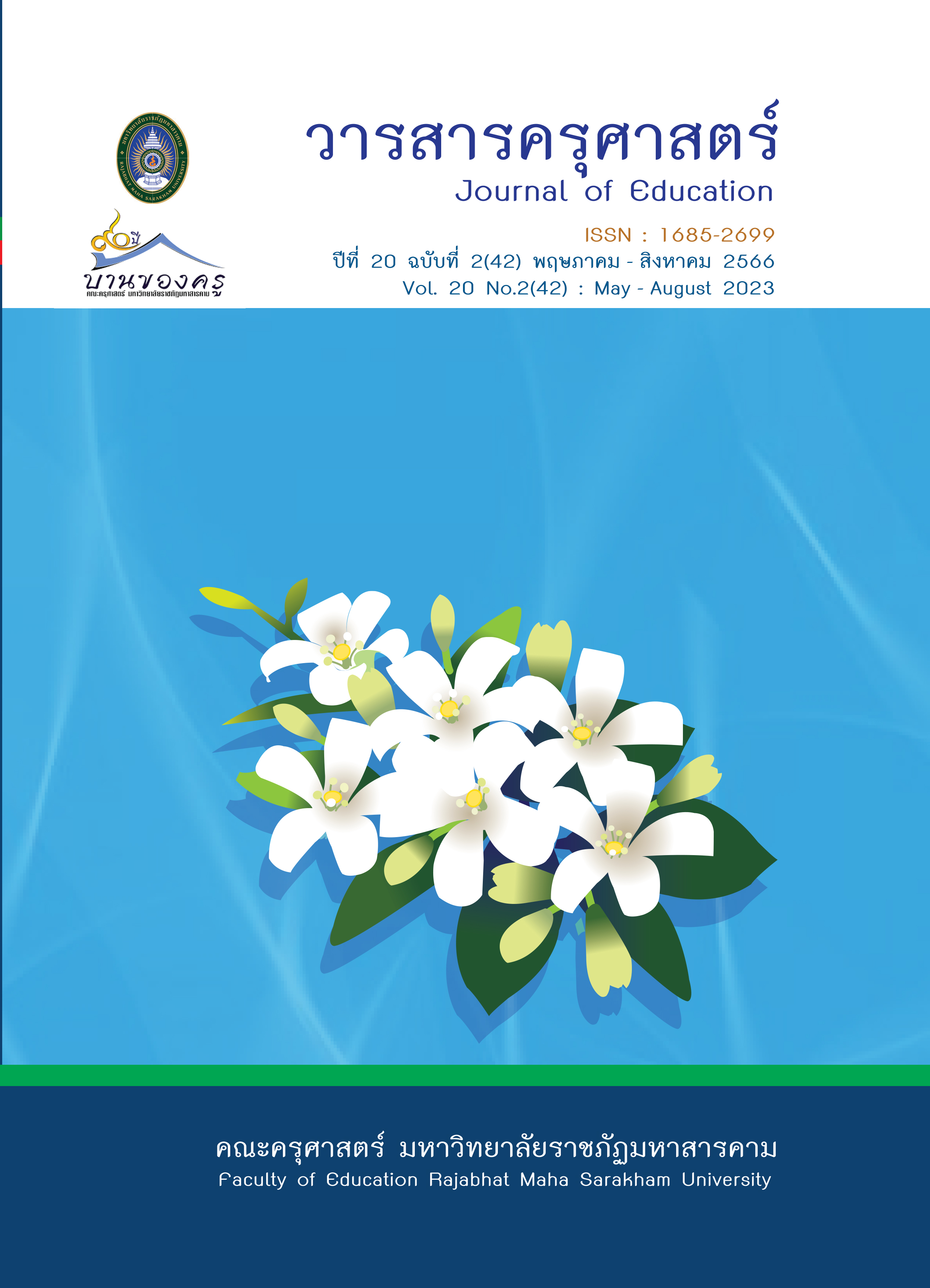The Application Digital Technology to Enhance Entrepreneurship in the Modern World for Undergraduate Senior Students at Kasetsart University Bangkok
Main Article Content
Abstract
The objective of this research was to explore the application digital technology to enhance entrepreneurship in the modern world for undergraduate senior students at Kasetsart University Bangkok. A total of 338 samples were from quota sampling of undergraduate senior students from four faculties in the field of Social Sciences at Kasetsart University Bangkok. The research tool was a rating scale questionnaire which content validity checked by three experts, the IOC values were between 0.67-1.00. The reliability was checked by Cronbach’s alpha coefficient value which was 0.96. The data analysis statistics were frequency, percentage, mean and standard deviation.
The research findings revealed the students’ opinions about instructor teaching practices for fostering entrepreneurship based on the VICTOR framework in overall at a high level (x̅=4.19, S.D.=0.27). The item with the highest mean score was risk taking (x̅=4.32, S.D.=0.39), whereas the lowest was value creation (x̅=4.05, S.D.=0.40). The application of digital technology to enhance entrepreneurship in overall was at a high level (x̅=4.17, S.D.=0.28). The item with the highest mean score was practice (x̅=4.21, S.D.=0.40), whereas the lowest was attitude (x̅=4.13, S.D.=0.36). It was found that students interested in applying digital technology to keep themselves up to date as well as facilitate their learning and working. The application of digital technology is an important skill of entrepreneurship in the modern world.
Article Details

This work is licensed under a Creative Commons Attribution-NonCommercial-NoDerivatives 4.0 International License.
ข้อกำหนดเบื้องต้นที่ผู้นิพนธ์(ผู้ส่งบทความ) ควรทราบ
1. ผู้นิพนธ์ที่ประสงค์จะลงตีพิมพ์บทความกับวารสาร ตั้งแต่เดือนมกราคม 2563 เป็นต้นไป ให้ใช้รูปแบบใหม่ (Template 2563) โดยสามารถดูตัวอย่างได้ที่เมนู GUIDELINES
2. จะตีพิมพ์และเผยแพร่ได้ ต้องผ่านการประเมินจากผู้ทรงคุณวุฒิ (Peer Review)
3. การประเมินบทความโดยผู้ทรงคุณวุฒิ (Peer Review) เป็นแบบ Double Blind
4. การอ้างอิงบทความใช้หลักเกณฑ์ APA (American Psychological Association) คลิก
5. บทความถูกปฏิเสธการตีพิมพ์ ไม่ผ่านการประเมิน ผู้นิพนธ์ขอยกเลิกเองหรือชำระเงินก่อนได้รับการอนุมัติ ทางวารสารไม่มีนโยบายการคืนเงิน
References
กนกอร เนตรชู และนริสรา พึ่งโพพธิ์สภ. (2562). ปัจจัยทางจิตสังคมที่เกี่ยวข้องกับพฤติกรรมเสริมสร้างตนเองสู่พฤฒพลังของผู้สูงอายุ ในชมรมผู้สูงอายุ กรุงเทพมหานคร. วารสารพฤติกรรมศาสตร์เพื่อการพัฒนา มหาวิทยาลัยศรีนครินทร์, 11(2), 34-36.
เจริญ ภูวิจิตร์. (2564). การจัดการเรียนรู้ทางออนไลน์อย่างมีประสิทธิภาพในยุคดิจิทัล. วารสารรัชต์ภาคย์, 15(40), 19-26.
ฉัฐชสรณ์ กาญจนศิลานนท์. (2559). การสร้างคุณค่าของลูกค้า ความพึงพอใจของลูกค้า ธุรกิจโรงแรม. Veridian E-Journal, Silpakorn University, 9(2), 18-25.
ฐชาพร เรณางกูร และบดินทร์ รัศมีเทศ. (2562). ปัจจัยที่มีอิทธิพลต่อการเลือกใช้บริการธุรกิจ Home Health Care. วารสารวิชาการสถาบันเทคโนโลยีแห่งสุวรรณภูมิ(สาขามนุษยศาสตร์และสังคมศาสตร์), 7(1), 13-19
ธวัช เหลืองวสุธา. (2557). ความรู้ ทัศนคติ และการปฏิบัติงานอย่างปลอดภัยของพนักงาน กรณีศึกษา บริษัทคอทโก้ เมททอลเวอร์คส จำกัด จังหวังระยอง [การค้นคว้าอิสระมหาบัณฑิต]. สถาบันบัณฑิตพัฒนบริหารศาสตร์.
ปัญญาพร ฐิติพงศ์. (2558). แรงจูงใจที่ส่งผลต่อประสิทธิภาพการปฏิบัติงานของบุคลากรในบริษัทก่อสร้าง : กรณีศึกษา บริษัท อินเตอร์ เอ็กซ์เพิร์ท คอนสตรัคชั่น จำกัด. Veridian E-Journal, Silpakorn University, 9(3), 15-21.
ภิญญาพัชญ์ ภูวงค์. (2559). การศึกษาความสามารถในการแก้ปัญหาและความเชื่อมั่นในตนเองของเด็กปฐมวัยด้วยการจัดประสบการณ์ โดยใช้กระบวนการทางวิทยาศาสตร์ ร่วมกับการละเล่นพื้นบ้านไทย. วารสารศึกษาศาสตร์ มหาวิทยาลัยขอนแก่น, 11(1), 31-36.
ภัทรวรรธน์ จีรพัฒน์ธนธร. (2563). การศึกษาเพื่อพัฒนาความเป็นผู้ประกอบการ. ภาควิชาอาชีวศึกษา คณะศึกษาศาสตร์ มหาวิทยาลัยเกษตรศาสตร์.
ศรัณภัสร์ แวกโกเนอร์. (2562). การเสริมสร้างคุณภาพชีวิตของนักศึกษามหาวิทยาลัยราชภัฏในเขตกรุงเทพมหานคร, มหาวิทยาลัยศรีนครินทรวิโรฒ. คลังสถาบันมหาวิทยาลัยศรีนครินทรวิโรฒ (SWU IR), 12(1), 14-26.
ศศิจันทร์ ปัญจทวี. (2562). ความตั้งใจเชิงพฤติกรรมในการใช้เทคโนโลยีของกลุ่มเจเนอเรชั่นเบบี้บูมเมอร์และ เจเนอเรชั่นเอ็กซ์. วารสารวิชาการ สถาบันเทคโนโลยีแห่งสุวรรณภูมิ, 6(2), 9-21.
สำนักงานสภาพัฒนาการเศรษฐกิจและสังคมแห่งชาติ. (2564). กรอบแผนพัฒนาเศรษฐกิจและสังคมแห่งชาติ ฉบับที่ 13. กระทรวงวิจัยและนวัตกรรมการอุดมศึกษา.
สุภาวรรณ ปานจุ้ย. (2560). การศึกษาทัศนคติที่มีต่อพรีเซนเตอร์ซึ่งมีพฤติกรรมถ่อยเท่ของกลุ่มวัยรุ่น ในกรุงเทพมหานคร. มหาวิทยาลัยธรรมศาสตร์: ม.ป.ท. สำนักงานการวิจัยแห่งชาติ, 8-12.
Anis, O. (2020). How can entrepreneurship and educational capital lead to environmental sustainability. Structural Change and Economic Dynamics, 54, 11-23.
Dana, L.-P., Salamzadeh, A., Hadizadeh, M., Heydari, G., & Shamsoddin, S. (2022). Urban entrepreneurship and sustainable businesses in smart cities: Exploring the role of digital technologies. Sustainable Technology and Entrepreneurship, 1(2), 53-65.
Demuyakor, J. (2021). COVID-19 Pandemic and Higher Education: Leveraging on Digital Technologies and Mobile Applications for Online Learning in Ghana. Education.
Launiala, A. (2009). How Much Can a KAP Survey Tell Us about People Knowledge, Attitude, and Practice? Some Observations from Medical Anthropology Research on Malaria in Pregnancy in Malawi. Anthropology Maternal Journal, 11, 13-27.
Pinto, M., & Leite, C. (2020). Digital technologies in support of students learning in Higher Education: literature review. Digital Education Review, 37, 14-20.


